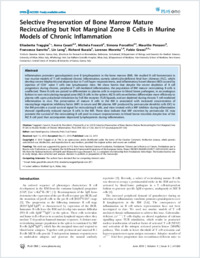Selective preservation of bone marrow mature recirculating but not marginal zone B cells in murine models of chronic inflammation
- Traggiai, Elisabetta Istituto Giannina Gaslini, Genoa, Italy
- Casati, Anna Institute for Research in Biomedicine (IRB), Faculty of Biomedical Sciences, Università della Svizzera italiana, Switzerland - Department of Biology and Genetics for Medical Sciences, University of Milan, Milan, Italy
- Frascoli, Michela Institute for Research in Biomedicine (IRB), Faculty of Biomedical Sciences, Università della Svizzera italiana, Switzerland
- Porcellini, Simona Institute for Research in Biomedicine (IRB), Faculty of Biomedical Sciences, Università della Svizzera italiana, Switzerland
- Ponzoni, Maurilio Pathology Unit, San Raffaele Scientific Hospital, Milan, Italy
- Sanvito, Francesca Pathology Unit, San Raffaele Scientific Hospital, Milan, Italy
- Leng, Lin Department of Medicine, Yale University School of Medicine, New Haven, Connecticut, United States of America
- Bucala, Richard Department of Medicine, Yale University School of Medicine, New Haven, Connecticut, United States of America
- Moretta, Lorenzo Istituto Giannina Gaslini, Genoa, Italy, University of Genoa, Genoa, Italy
- Grassi, Fabio Institute for Research in Biomedicine (IRB), Faculty of Biomedical Sciences, Università della Svizzera italiana, Switzerland - Department of Biology and Genetics for Medical Sciences, University of Milan, Milan, Italy
-
22.06.2010
Published in:
- Plos one. - 2010, vol. 5, no. 6, p. e11262
English
Inflammation promotes granulopoiesis over B lymphopoiesis in the bone marrow (BM). We studied B cell homeostasis in two murine models of T cell mediated chronic inflammation, namely calreticulin-deficient fetal liver chimeras (FLC), which develop severe blepharitis and alopecia due to T cell hyper responsiveness, and inflammatory bowel disease (IBD) caused by injection of CD4+ naïve T cells into lymphopenic mice. We show herein that despite the severe depletion of B cell progenitors during chronic, peripheral T cell-mediated inflammation, the population of BM mature recirculating B cells is unaffected. These B cells are poised to differentiate to plasma cells in response to blood borne pathogens, in an analogous fashion to non-recirculating marginal zone (MZ) B cells in the spleen. MZ B cells nevertheless differentiate more efficiently to plasma cells upon polyclonal stimulation by Toll-like receptor (TLR) ligands, and are depleted during chronic T cell mediated inflammation in vivo. The preservation of mature B cells in the BM is associated with increased concentration of macrophage migration inhibitory factor (MIF) in serum and BM plasma. MIF produced by perivascular dendritic cells (DC) in the BM provides a crucial survival signal for recirculating B cells, and mice treated with a MIF inhibitor during inflammation showed significantly reduced mature B cells in the BM. These data indicate that MIF secretion by perivascular DC may promote the survival of the recirculating B cell pool to ensure responsiveness to blood borne microbes despite loss of the MZ B cell pool that accompanies depressed lymphopoiesis during inflammation.
- Language
-
- English
- Classification
- Medicine
- License
- Open access status
- gold
- Identifiers
-
- RERO DOC 326623
- DOI 10.1371/journal.pone.0011262
- ARK ark:/12658/srd1318883
- Persistent URL
- https://n2t.net/ark:/12658/srd1318883
Statistics
Document views: 164
File downloads:
- Texte intégral: 147
